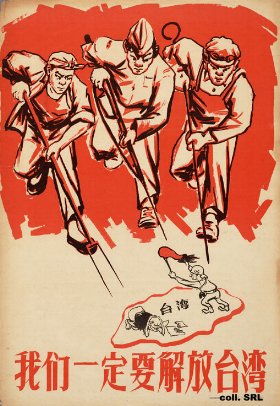An Examination and Polemic
by Brian Hioe
語言:
English /// 中文
Photo Credit: Chinese propaganda poster
A Coming of Age for the Taiwanese Left?
WITH THE RISE of new, Left-leaning third parties as the Social Democratic Party, the New Power Party, and the Free Taiwan Party, the present seems like an era of a resurgent Taiwanese Left. Or perhaps the present represents an era in which a political Left seems possible for the first time in Taiwanese history. After all, after so many years of state-enforced anti-communism at the hands of the KMT during the authoritarian period, and that has Communist China presented the most pressing threat to Taiwan’s continued sovereignty since 1949, Taiwanese society was rather hostile towards any self-proclaimed political Left.
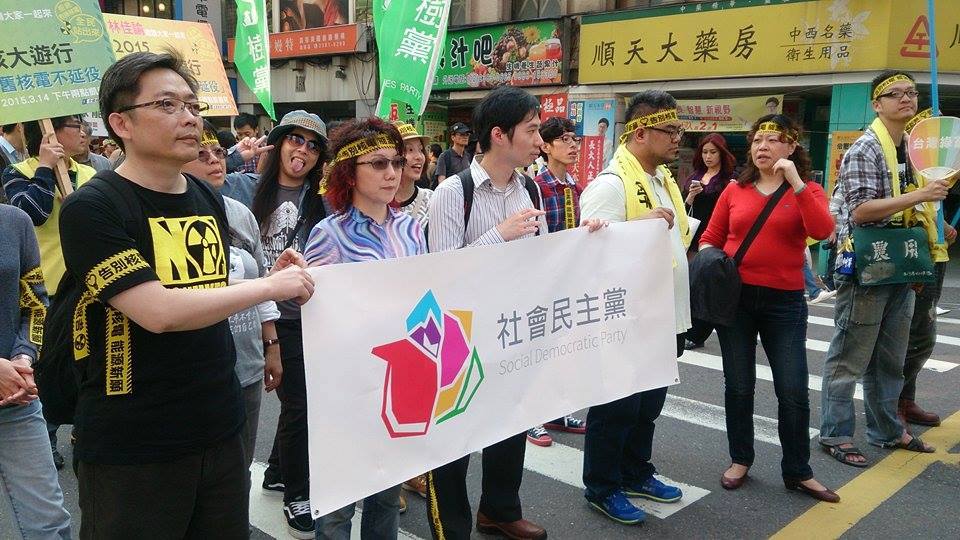 Members of the Social Democratic Party at a demonstration, party founder and National Taiwan University professor Fan Yun is second from the left. Photo credit: 社會民主黨
Members of the Social Democratic Party at a demonstration, party founder and National Taiwan University professor Fan Yun is second from the left. Photo credit: 社會民主黨
But it would seem that the Taiwanese Left has seen a reversal of fortunes after the Sunflower Movement, with the emergence of new parties. Even as it may remain to push these new Leftist parties towards a more radical political platform and one may probe as to how substantive the political platform of any of these new parties is, what is shared in common is a claim towards Leftist political positions. The Social Democratic Party models itself and draws upon the tradition of European social democracy. Tsay Ting-Kuei of the Free Taiwan Party belongs to the left-wing tradition of Taiwanese independence, for example, as marked by his close acquaintance with legendary Taiwanese independence activist and early 20th century Marxist revolutionary Su Beng, born 1918, still alive today despite nearing 100 years of age. The Sunflower Movement itself which marked the beginning of all this was a movement in a which a number of key figures and leaders privately claimed radical Left political positions, even if they were less willing to openly express them in the public eye.
Can we say that the newly emergent third parties—the so-called “third force” in contemporary political parlance (第三勢力)—are pro-Taiwanese independence? That may be a slight stretch, where Taiwanese independence continues to be controversial enough an issue that only the Free Taiwan Party has explicitly made Taiwanese independence a part of its party platform, as its central plank. But certainly, in the way that these new parties came out of Taiwanese civil society, which seized the stage during the Sunflower Movement last year, the de facto stances of these parties orients towards Taiwanese independence. One would be hard pressed to find a member of each of these parties who identifies as pro-unification, after all. And even though even these parties have remained strategically opaque on the issue of making Taiwanese independence de jure independence, what is shared is a commitment to defending Taiwan’s existing independence.
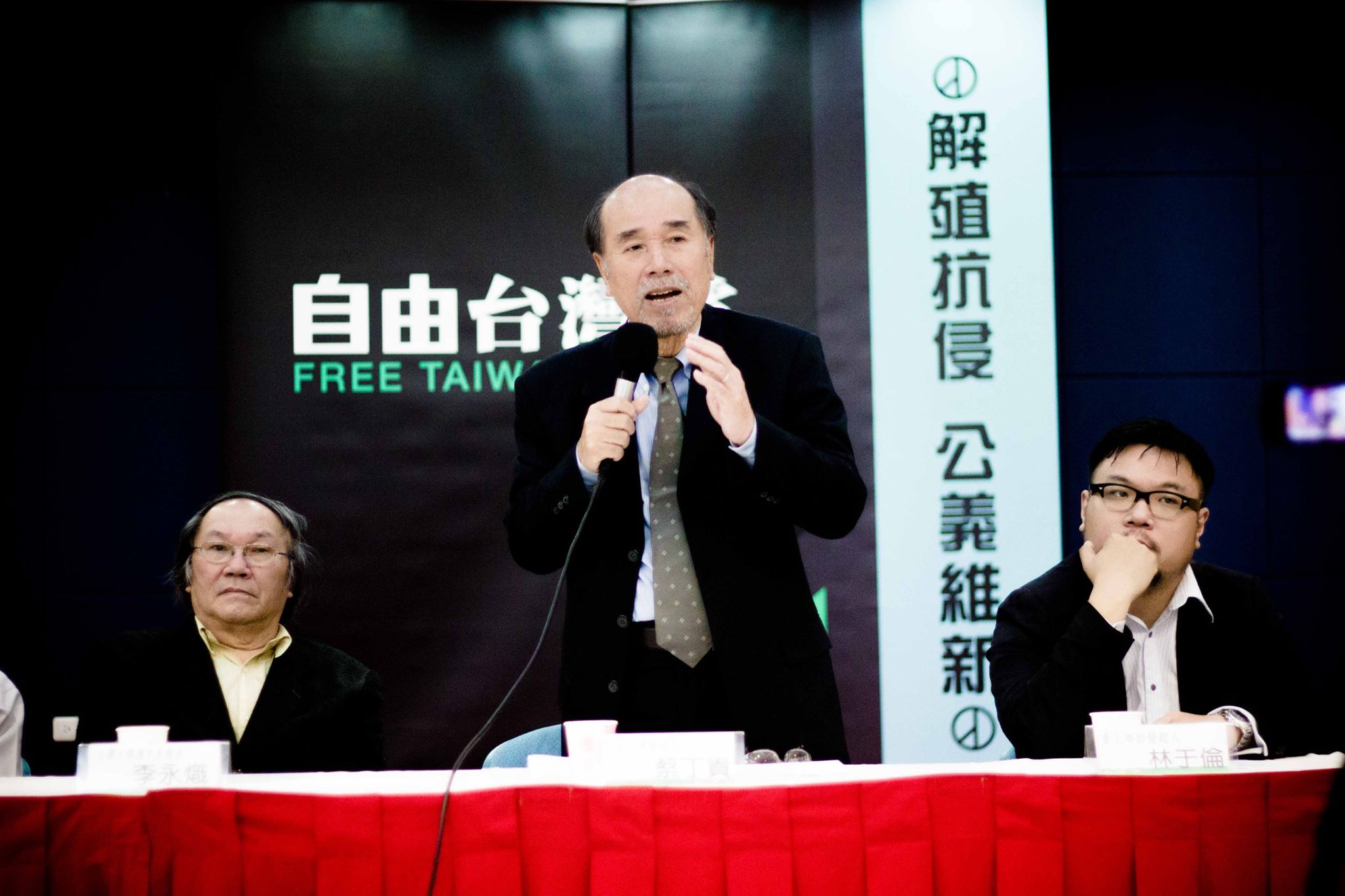 Free Taiwan Party founder Tsay Ting-Kuei announcing the founding of the party at a press conference in April
Free Taiwan Party founder Tsay Ting-Kuei announcing the founding of the party at a press conference in April
However, what has gone ignored is the fact that Taiwanese independence has not explicitly been a political platform of the left-wing, but that there exists a self-proclaimed left-wing which is anti-Taiwanese independence, and pro-unification, not only in Taiwan but overseas. And as it would seem with the pro-independence Left (左獨) ascendant, the actions of the pro-unification Left (左統) in Taiwan and outside Taiwan has become increasingly aggressive in its criticisms and attacks conducted on Taiwanese civil society. Namely, what is aimed for by these groups, mostly Marxist or socialist in orientation, is the establishment of a single socialist nation, inclusive of China, Hong Kong, and Taiwan.
Are Taiwan’s newly emergent third parties truly Left? That is to be seen. Maybe not so, in the end. It is too early to judge. But certainly, these parties are no more or less “Left” than those who would claim that the Chinese Communist Party remains “Left.” We might venture an examination of the basis of the pro-unification Left’s attacks and some criticisms of our own.
Attacks on the Class Basis of Taiwanese Civil Society
IN REGARDS TO some of the critiques against Taiwanese civil society coming from the pro-unification Left, one is first struck by that these critiques universally claim to be “Marxist” in character, but rather than reflect Marxism, more broadly reflect the tenets of Maoism and Stalinism.
As published, for example, in Taiwanese online magazine Coolloud, criticisms of the Sunflower Movement referred to the movement as “fascistic” in character because of its popular basis, and sought to argue that the movement was fascistic in aims insofar as it aimed at the preservation of capitalism. Attempts to point to a specifically reactionary class character to the movement where the movement was not a movement of the working class say, but broadly inflected a middle class orientation.
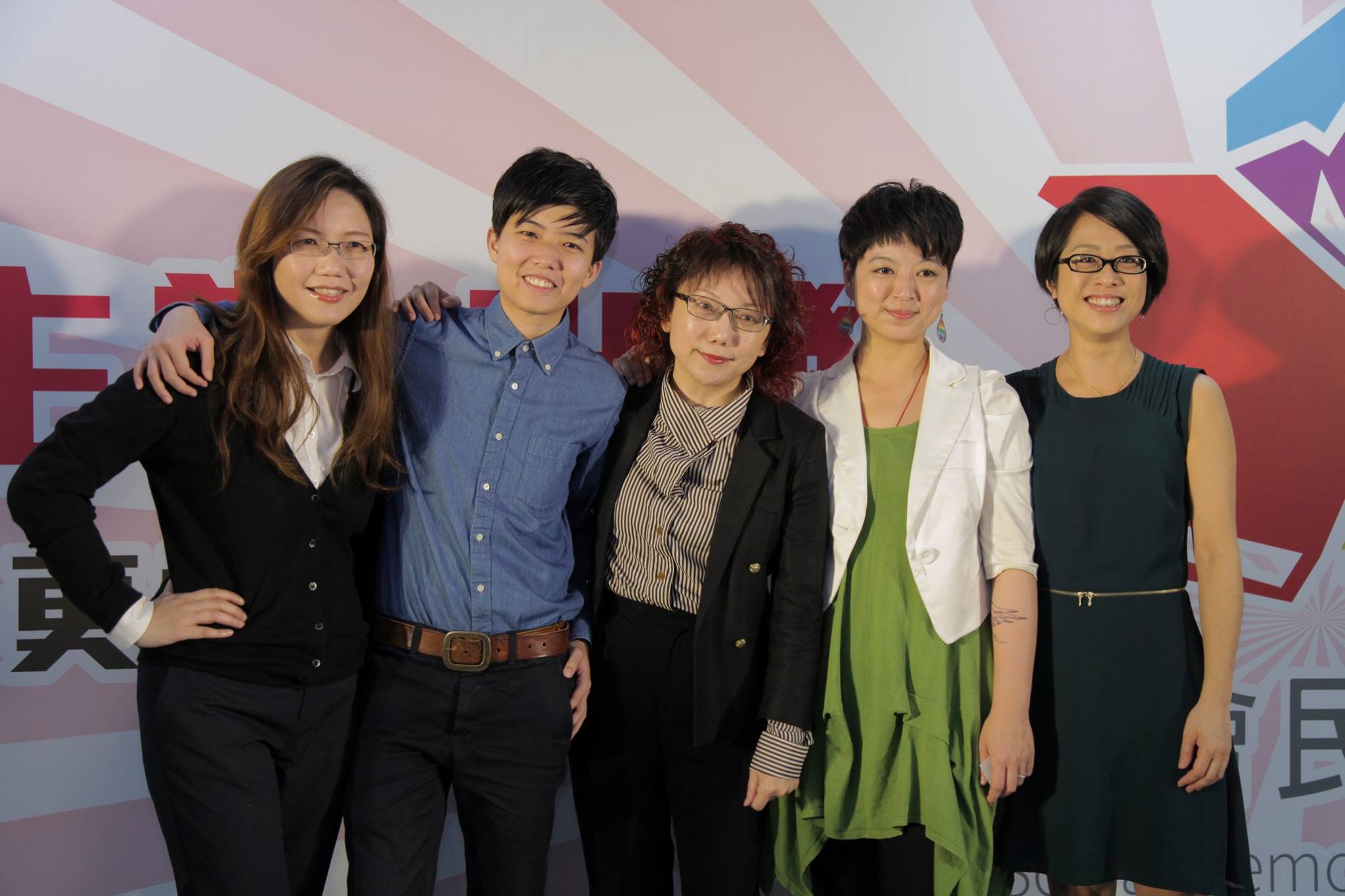 Social Democratic Party candidates. Li Yan-Rong is furthest on the right. Photo credit: 社會民主黨
Social Democratic Party candidates. Li Yan-Rong is furthest on the right. Photo credit: 社會民主黨
Further attempts to criticize Taiwanese civil society after the Sunflower Movement along similar lines continue in the present. So it is that Social Democratic Party candidate Li Yan-Rong was denigrated as a “capitalist candidate” on the basis of her background as the daughter of the AU Optronics, a corporation with a conservative political orientation, this despite that Li Yan-Rong was going against her family in running as a candidate of the Social Democratic Party. But it did not matter in this worldview, rather, what was important was Li’s class background, which would be what ultimately was important, as to whether Li was a politically progressive candidate for Taiwan or not.
It would seem that in this worldview, individual political choices did not count, but what was important was one’s class background, which was seen as implicitly determining of one’s political views. Where Marxism was taken up here, it was in the deterministic, mechanistic fashion of attempting to label individuals seen as politically unsavory to be reactionaries on the basis of class. Shades of the Cultural Revolution, anyone? One is also reminded of Pier Paolo Pasolini’s quip, that the police were right to beat the Italian student protestors of 1968—for it was the police who were the children of the working class and not the students! But at heart of such critiques was deeply-rooted antagonism to Taiwanese independence, dressed up in the garb of Marxism. This is the so-called pro-unification Left (左統) position.
Attacks on Taiwan as a “Puppet” of American Imperialism
WHERE THERE EXISTS a pro-unification Left inside Taiwan, as represented in Coolloud, Ground Breaking and other publications, with the orientation of Taiwan’s pro-unification towards China, it is not surprising that the pro-unification Left would be coextensive with China. An example would be the online magazine Ground Breaking, which, ironically, shares its Chinese name with this publication, that is,「破土」, although New Bloom predates Ground Breaking by some six months. As have been noted by some commentators, the irony is that our publication, New Bloom, is a publication of the pro-independence Left, while Ground Breaking is a publication of the pro-unification Left Indeed, in Ground Breaking, news about Taiwan and, for that matter, Hong Kong, is published within the “Domestic China” (国内) section.
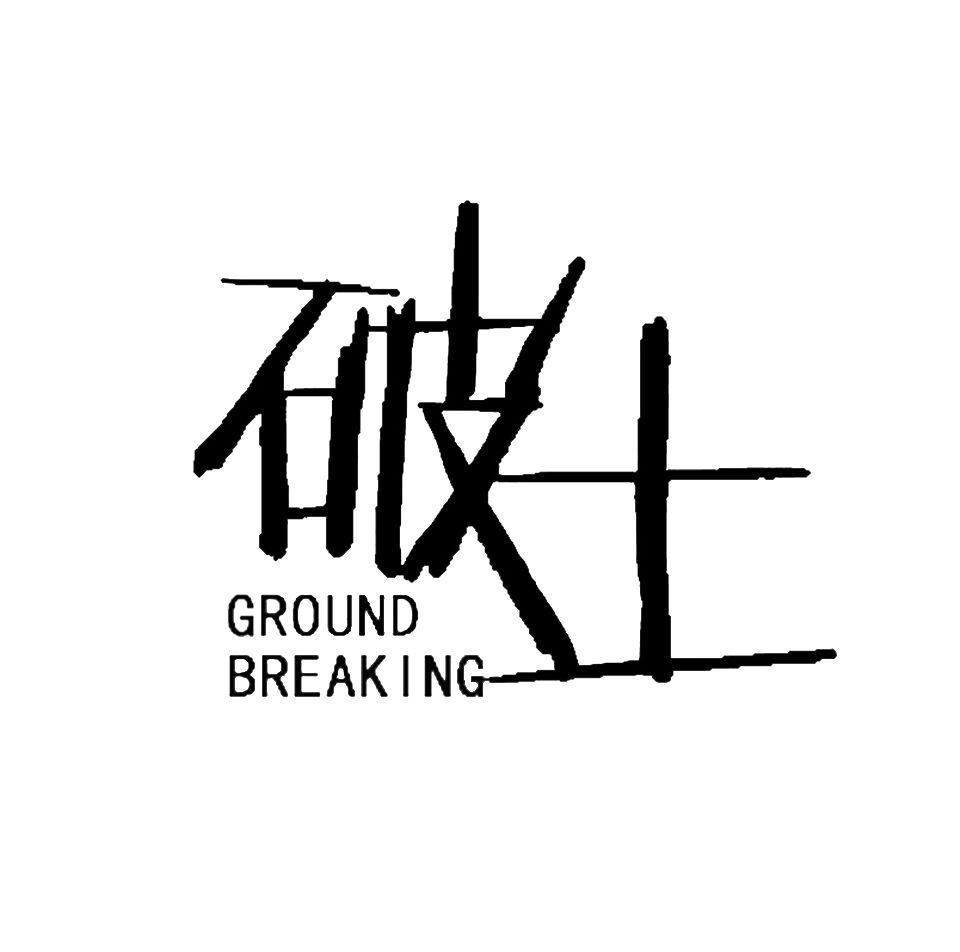 破土 Ground Breaking logo
破土 Ground Breaking logo
While Ground Breaking has been taken up popularly overseas by those seeking a Leftist critique of present-day China because of its presence in social media outlets used in the West as Facebook. But an editorial in Ground Breaking would argue on the one year anniversary of the Sunflower Movement that the Sunflower Movement was a petty bourgeois movement, ultimately not anti-capitalist, and in that way, vaguely reactionary. Other critiques would follow against Taiwanese civil society in its very nature, suggesting the structure of civil society as dependent upon capitalism, and therefore less than exactly progressive. More recently, articles published in Ground Breaking would question the strong and immediate reaction by Taiwanese activists against the Ma administration’s decision for Taiwan to unilaterally apply to China’s Asian Infrastructure Investment Bank (AIIB), where China’s broader initiative at expanding its influence overseas of which the AIIB is part of, the “One Belt, One Road” plan, could potentially serve an anti-capitalist agenda in eroding the power of American imperialism, although to be sure Ground Breaking also was interested in hosting debates as to whether the “One Belt, One Road” plan was purely just capitalist in nature or not.
Compared to the class reductionist smears against Taiwanese activists originating from within Taiwan through Coolloud and other publications, one does in fact have to take Ground Breaking’s arguments as having some measure of truth. If by “petty bourgeois,” Ground Breaking’s writers mean “middle class,” it is true that the Sunflower Movement was not exactly a movement in which workers took center stage, and the Sunflower Movement was far from an anti-capitalist movement. Civil society, too, is a formation which is coextensive with the development of the modern state and free market and in fact, civil society usually runs up against its limitations where it makes demands of the state but is in last measure dependent upon the state to acquiesce to and enact its demands—thus civil society is ultimately dependent upon making limited changes within the broader status quo of society.
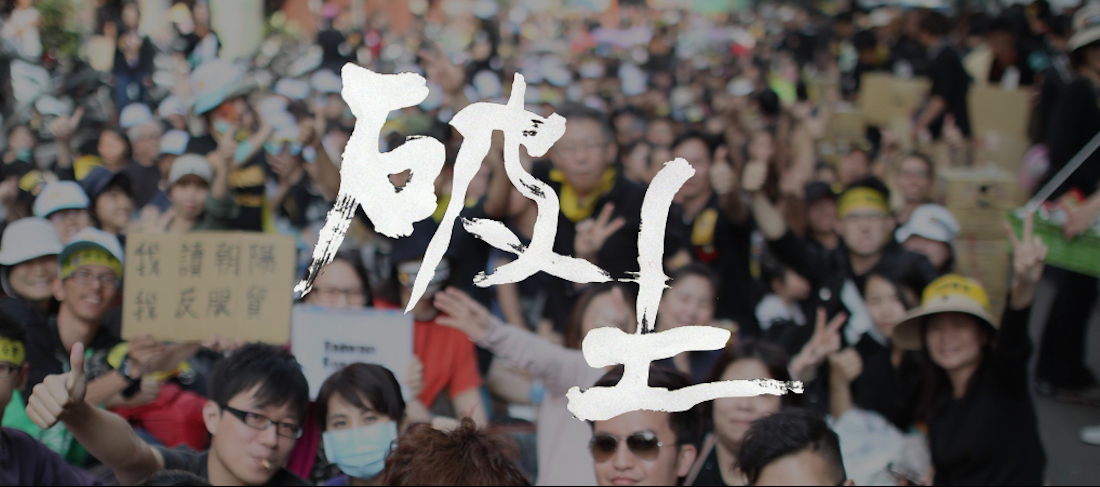 破土 New Bloom logo
破土 New Bloom logo
Where Ground Breaking’s arguments fall flat it is where they fail to engage with any of the critiques which might be made quite validly of Taiwanese nationalism, when it can verge into ethno-nationalist dimensions. The so-called “Left Independence” position can and should be criticized where it belies Taiwanese ethno-nationalism, or where verges into anti-Chinese xenophobia. After all, the Left position is that position which thinks in international terms, in regards to the international working class rather than just the working class of Taiwan against China.
But Ground Breaking’s arguments rather bely a form of Chinese nationalism. It is ironic that there is not discussion of an international working class in their arguments, but countries are reductively deemed to be capitalist or socialist. While even Ground Breaking would question the continued claims of China to socialism, China is still seen as a more progressive alternative to Taiwan— seen as a capitalist country and a puppet of the US, the world’s supreme capitalist power, and the apparent one and only legitimizer of the world’s present socioeconomic woes.
In this view, Taiwan, as a client state of America, is reductively seen as a “puppet-state” of America and nothing else. Any claim by Taiwan to its own national identity or aspiration towards independent self-determination is assigned a place as American “splittism” directed against China with the aims of splintering its only rival to the status of world superpower—much as the Soviet Union eventually splintered under the weight of the Cold War. Namely, in this worldview, there is the fear that the malevolent forces of the US are acting to attempt to split apart China from the inside, much as the Soviet Union split apart at the end of the Cold War.
Where Taiwanese claim an independent cultural identity, where an independent Taiwanese cultural identity distinct from China is clearly a product of history, the attempt is made to wave the specter of independent identity away as a product of history. Where the Taiwanese identity is clearly not something which has existed since the beginning of time immemorial given time, it will fade, they say.
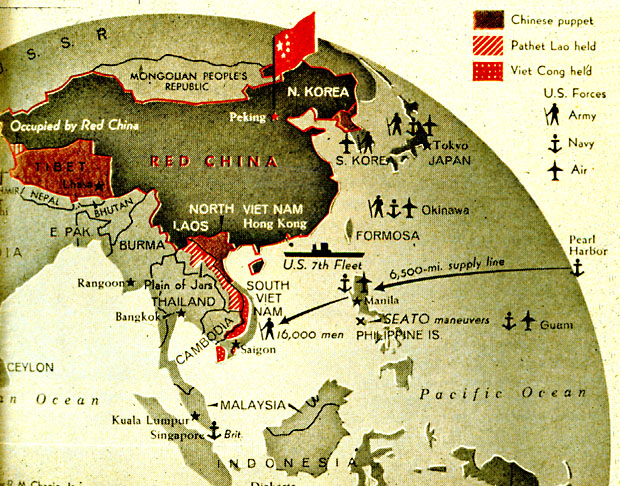 Cold War era map of Southeast Asia
Cold War era map of Southeast Asia
It is true that it is about as pointless to speak of an ahistorical, eternal Taiwanese identity as it is to speak of an ahistorical 5,000 year old Chinese empire, which has persisted unchanged through history, apparent homogeneous in composition despite shifts in the geographic territory of China and of what ethnicities were included within the bounds of “China”. But of course, Marxism is hardly about reductively attributing all social phenomena to economic causes, in the realm of cultural identity or otherwise. And in such considerations the will of the people of Taiwan never comes into consideration.
One is struck by that for all the theoretical frameworks drawn upon by writers in Ground Breaking, actually drawn from western critical theory which originates from America or Europe, they are usually used in service of justifying China as an alternative to American, capitalist, imperialist dominance of the world. And Ground Breaking writers find themselves thinking not in terms of the international working class, inclusive of Taiwan, China, and America, but in terms of “capitalist” or “socialist” nations pitted against one another. Is it that the language of Marxism has become just a cipher for a form of Chinese nationalism?
A “United Front”? Taiwan’s Pro-Unification Left and China’s New Left
GROUND BREAKING is a publication with a domain registration in Beijing, includes in its staff academics drawn from across “Greater China” in Taiwan, Hong Kong, and mainland China. But Ground Breaking has a large social media constituency initially drawn from Hong Kong, and takes steps to maintain a social media presence in social media outlets more commonly used in East Asian countries outside of China and the West, that is in Facebook. Yet one is struck by not only the similarity of Ground Breaking to the Chinese New Left (新左派), but suspects that it is in fact an attempt by elements of the Chinese New Left to expand the influence of the New Left to outside of mainland China. Though having some coverage of Hong Kong, Ground Breaking has been curiously silent on Hong Kong regarding the Umbrella Movement and its aftermath. It may be that Ground Breaking wishes to keep silent where in the present political climate, taking too explicit a pro-unification position in Hong Kong would radically alienate Ground Breaking from Hong Kong Leftists in wake of the Umbrella Movement?
Why would there be a need for a Ground Breaking in China, after all when we already have a large ecology of New Left sites, the largest of and most significant of which is Utopia, for example? So it is that with the existence of the pro-unification Left (左統) in Taiwan, Taiwan readers of Ground Breaking assuming that Ground Breaking’s presence on Facebook means it is not a mainland Chinese publication, or have assumed that Ground Breaking is in fact a pro-unification Left publication on the basis of similar argumentation. This may be a mistake, where it may be more accurate to see Ground Breaking as closer to a New Left publication, but participating in the shared overlap of the Taiwanese pro-unification Left and Chinese New Left. Apart from an interest in the work of key figures of the New Left as Wang Hui, for example, articles follow some similar argumentation as articles which have appeared in Utopia, for example, concerning class-based criticisms of Chai Jing’s documentary “Under the Dome.”
Speculatively, while one cannot be sure, it may be that elements of Taiwan’s pro-unification Left, pro-unification elements in Hong Kong, and China’s New Left may have formed something of a “United Front.” What is shared among all three is that the heavy emphasis upon labor and the plight of the working class blends into a form of Chinese nationalism.
Has Marxism in China Become a Form of Nationalism?
IS IT THAT Marxism as used within the pro-unification Left and Chinese New Left is just as a form of Chinese nationalism? To be sure, Mao spoke of the “Sinification” of Marxism. Is that what has been left after this process is just national ideology?
We might suggest the utility of Marxism to facilitate modernization, where nationalism is an ideology that appears to facilitate the historical need for modernization. Where China and Stalin came under the control of self-proclaimed Marxist regimes after a period of “backwardness” relative to modernizing Europe, and modernization was facilitated forcefully by these self-proclaimed Marxist regimes at great human cost. Marxism in China and the Soviet Union would serve as the national ideology of this process.
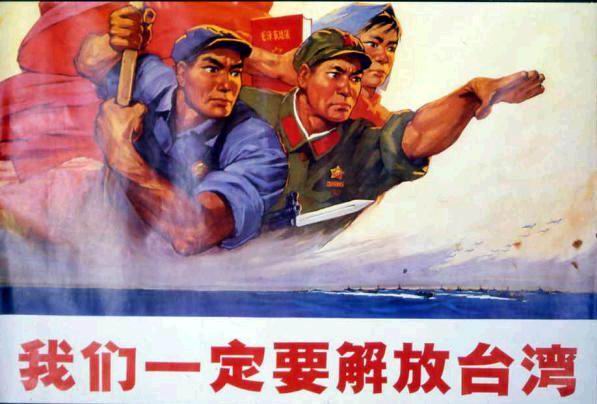 Propaganda poster vowing the “liberation” of Taiwan. Note the depiction of a worker, solider, and peasant in the poster
Propaganda poster vowing the “liberation” of Taiwan. Note the depiction of a worker, solider, and peasant in the poster
Moreover, the discourse of nationalism is founded upon the privileging of a certain people as a chosen national people as well as the exclusion of those “Others” who must necessarily be excluded from the social order. It is this dual process of exclusion and inclusion which is constitutive of nationalism. And if we are to point to how Marxism through Mao’s “Sinicization of Marxism” became a form of nationalism in China, the chosen people of this Marxist nationalism was the working class, or more to the point, workers, peasants, and soldiers, and the excluded “Others” were those judged to be bourgeoisie class enemies. This is a way in which the sad fate of Marxism in China has been to become a form of nationalism. Never mind that these labels were often ideological in nature, rather than actually indicating the socioeconomic status of those they supposedly referred to, and used mechanistically.
Similarly, where class equality was supposed to erase racial and gender oppression during the Maoist period, as those who glorify the Mao period like to raise, behind this remained Han supremacy and hetero-patriarchy. Even as Maoist of varying stripes enjoy pointing to the supposed racial and gender equality of China during Mao’s rule versus the present.
Where race is concerned, we need only to watch that masterpiece of 1950s Chinese socialist realist cinema, Nongnu (農奴), to find that China’s “minority nationalities” were viewed as far from equals to Han, but barbaric peoples in need of a civilizing mission by their Han superiors. The seminal film of the “minority nationalities” genre of film during the Mao period, Tibetans are depicted in Nongnu as a barbaric people who must be rescued from their own religious and cultural savagery by their Han superiors. In this case, where we elsewhere speak of western colonialism as taking place under the auspices of “the white man’s burden,” perhaps we might speak here of Han Chinese colonization as justified through “the Han man’s burden.”
 Film poster for Nongnu
Film poster for Nongnu
Even if it is true that gender inequality was far from as severe as today under the Maoist era, if it is true gender equality was realized under the Mao era as some like raise the specter of through the rose-tinted lens of nostalgia, why was it that gender inequality reared its head so quickly reared its head after the Deng period, for example, with the current plight of so-called “leftover women” in China in the present? And why was it that homosexuality became more relatively open in the public eye after the turn of China towards the free market and the attendant opening up of China in terms of social values, if not because of the suppression of homosexuality under state-mandated heterosexuality in the Maoist period? How, then, was patriarchy was so quickly restored once the Maoist period ended if the Maoist period was such a paradise?
Was Maoist China ever truly such a utopia? Or was this supposed utopia of equality one in which the surface appearance of equality was maintained at all times through threat of force? Political power grows from the barrel of a gun…
But in the fashion that nationalist ideologies more often use the discourse of tradition in order to facilitate a process of modernization, has it that Marxism has become viewed in line with tradition. One certain finds many today in China who speak of Marxism today as if Marxism were in itself a discourse which had originated in China, rather than being imported from the West along with the host of western discourses imported in the late Qing and early Republican period, after all. Yet in this light, it proves ironic that the pro-unification Left is often so dependent upon bridging the gap between the Maoist past and the present through the use of western critical theory.
Chinese Nationalism and Marxist Theory
BUT WHILE THE Chinese New Left has seen its heyday of popularity with well-meaning, Leftist western academics who turn a blind eye to the nationalistic project undergirding the leftism of the New Left, recent times have seen blowback against the New Left as Chinese nationalists whose importation of western critical theory is for the purposes of China’s self-strengthening in the realm of ideology. To make nationalist arguments in the language of critical theory is, after all, necessary for China’s contemporary nationalist project to defend its raison d’être in the language of an up to date claim to leftist credentials, where China’s history of Maoism has led Leftism to blend with Chinese nationalism, and the invocation of Leftism becomes an invocation of Chinese nationalism more than anything else.
Yet what is ironic about Ground Breaking’s arguments is to what degree they draw on western critical theory, particularly the strands of what is sometimes referred to as “neo-Marxism.” One finds frequent invocations of the Frankfurt School, Benedict Anderson, David Harvey, and others within the work of Ground Breaking. More broadly situated in the neo-Marxist milieu, Ground Breaking has a tendency to be over-obsessively fannish about certain western theorists, and the rise of Leftish third parties or social formations in Europe or Latin America such as the Greek SYRIZA, the Spanish Podemos, or the Mondragon cooperative—and not social movements in other parts of Asia, such as in Hong Kong, Taiwan, Japan, Korea, or elsewhere, of which they are usually more critical—particularly in the cases of Hong Kong and Taiwan, far closer to home as fellow parts of so-called “Greater China.”
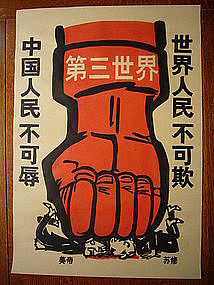 Chinese propaganda poster advocating the rise of the Third World against capitalists powers
Chinese propaganda poster advocating the rise of the Third World against capitalists powers
One find something of China’s national condition vis-a-vis the West reflected in this fact, where despite China’s rising economic and political ascendancy, China is marked by profound anxieties regarding its lacking cultural prestige relative to the West. Thus, China is fascinated with Western models which it hopes to emulate, even as it hopes to overcome the West. In the sense that western theory and western political exemplars seem so important for political tendencies as Ground Breaking, the Chinese New Left, and the pro-unification Left in Taiwan because of the continued adulation of western models. Through this, they attempt to prove China is on equal terms with the West, even as all this is enlisted in the attempt to overtake the West. This is hardly the first contradiction at work here, but this, too, strikes of nationalism where Asian nationalisms during the past century where characterized by the idolization of the West at the same time as attempts were made to prove China’s ability to achieves parity or even supremacy to the West. We can maybe take this as representative of the schizophrenic character of many nationalisms.
A Nationalist Reaction Against American Imperialism?
INDEED IT MAY be that all goes goes back all the way to the colonialism which forcibly introduced western modernity to Asia, and Asian attempts to overcome western modernity. After all, when the nationalist attempt is made to not only slough off colonial rule through anti-colonialism, but also to overcome the western modernity altogether to achieve Asian parity with or supremacy over the West. In its logical conclusion, this could mean to become an imperial power in the mold of the western colonizers oneself.
One certainly sees this with the Japanese empire in the first half of the 20th century, and perhaps in the latter half where Maoist China claimed internationalist aims of third-world revolution, that both of these nationalist struggles could belie their own imperialist aims. We may see it again in the present. Except where the present comes after all this previous history, previous history is haphazardly drawn from in order to legitimate the present. Self-proclaimed “Leftist” elements in present day China appropriates the discourse of anti-American imperialism in order to justify its expansionist projects in Asia, and even Africa and South America, as a result.
Some are, in fact, just genuinely taken in by this play of images. In previous periods of history as the late Qing and early Republican period, it strikes as that the mass importation of western theory was for the sake of national self-strengthening projects, this importation was usually haphazard and more the appropriation of selective elements of theory to fit the contours of preexistent nationalist ideology.
But we see this all too clearly in the present where it strikes as the pro-unification Left in Taiwan or Hong Kong, the Chinese New Left, or other formations seem to import western theory on a selective basis in order to dress up what is at heart an mainland Chinese nationalism in the valences of the political Left. Again, something seems highly tautological in much importation of western theory, with the generally selective appropriation of western theory where it can be useful in supplementing preordained conclusions about China which originate from a nationalist point of view—and then using that western theory in order to justify China’s nationalist position against the Western world. Never mind that this proves ultimately an abuse of theory.
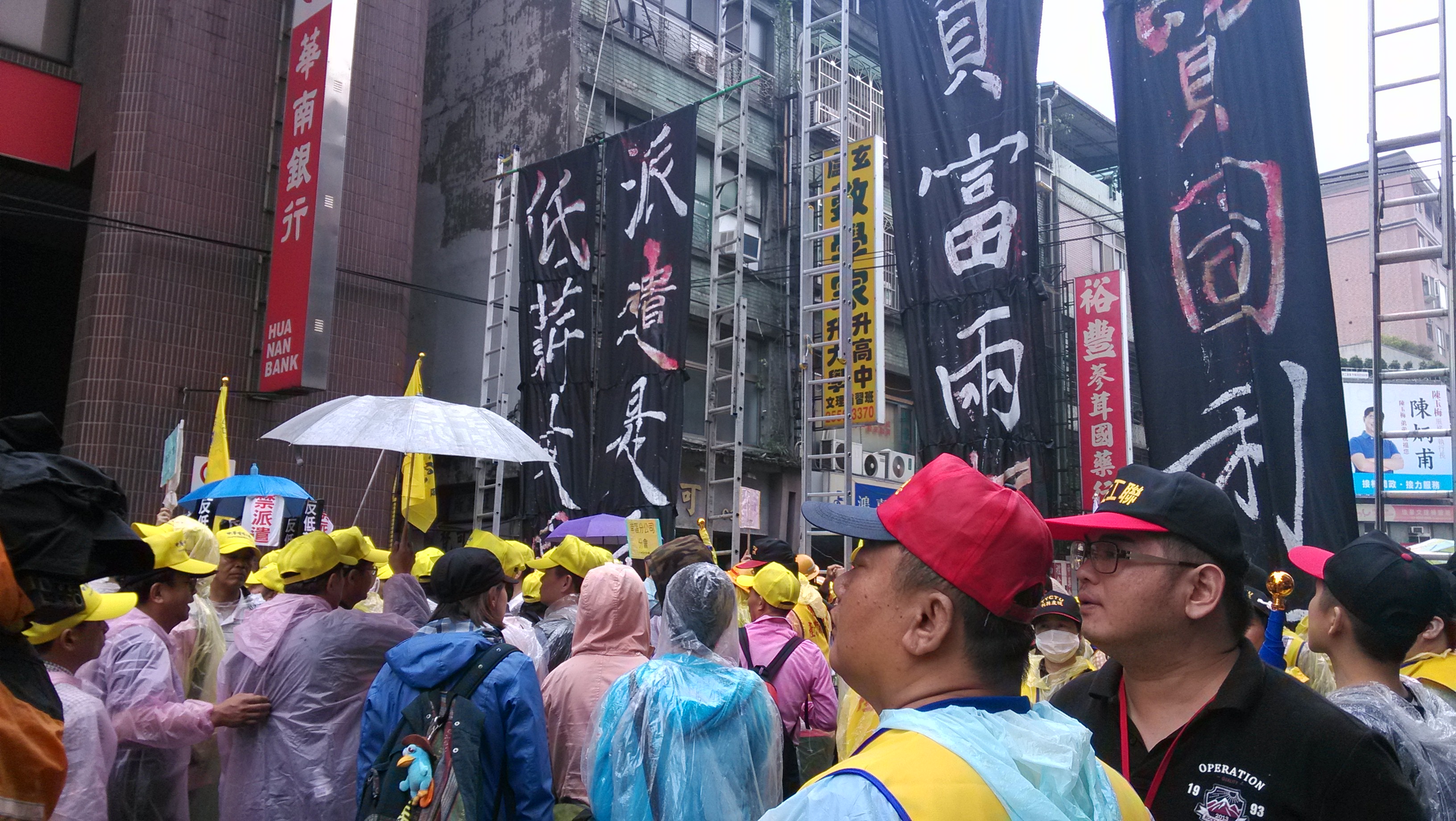 2014 May Day in Taiwan. Photo credit: Brian Hioe
2014 May Day in Taiwan. Photo credit: Brian Hioe
Yet where at all is the international working class in all this? Pro-unification formations think only in terms of nation-states, and capitalist powers versus socialist ones, never thinking beyond to a transnational framework of analysis. This belies the longer history of the Stalinist policy of “socialism in one country” and the subordinating of the cause of international revolution to the Soviet Union’s own nationalist interests as the supposedly sole socialist power of the world. Mao’s China roughly does the same after the Sino-Soviet split, even when it claims to advance the cause of third-world liberation, advancing China’s particular geopolitical interests while claiming the discourse of a international revolution in the interests of the global working class.
So, then, against those who criticize Taiwanese independence but bely a form of Chinese nationalism behind their criticisms, when we advocate Taiwanese independence, are we merely embodying a form of Taiwanese nationalism? We might, then, ask deeper questions about how Taiwanese independence would advance the international Left.
Conclusion: What of the Taiwanese Working Class? What of the Taiwanese People?
IN CONCLUSION, we might ask ourselves, what is the will of the Taiwanese people? Is it not that in advocating Taiwanese independence we are seeking to stand for the will of the Taiwanese people—and that this is a Left position?
It is interesting to note that many of those who currently advocate Marxism from a pro-unification position have apparently abandoned the Marxist principle of self-determination. Even when pro-unification Leftists approach the issue from an older, more traditional “orthodox Marxist” perspective, it is a telling absence that the principle of self-determination has dropped out of the vocabulary even when it was at the heart of the Marxist tradition that such pro-unification Leftists otherwise draw on for backing. This becomes even more paradoxical when pro-unification Leftists are relentlessly enthusiastic about self-determination issues farther from home, as in Scotland, Catalan, Palestine, or elsewhere—but not closer to home, as evidenced in a distinct lack of sympathy to the cause of Taiwanese independence.
Once again, this would be a way in which underlying purported Leftism is actually nationalism. Taiwan has been colonized endlessly within the span of the last several years, whether by way of indigenous peoples facing down Chinese colonization in the Ming and Qing dynasties, Japanese colonization following the 1895 Treaty of Shimonoseki, KMT colonization after the end of the Chinese Civil War. And now Taiwan faces the threat of colonization from China, that is, the People’s Republic of China. Where do considerations of the dignity of a people play into the consideration of pro-unification Leftists?
Moreover, it likely has not occurred to pro-unification Leftists that in advocating anti-colonial and anti-imperial struggles, at times, they might become apologists for Chinese imperialism, an imperialism which veils itself in the discourse of Leftism. Indeed, in consideration of that Taiwan already has de facto independence from China, it should be far more obvious to pro-unification Leftists that that they are in fact calling for the annexation of a de facto independent territory rather than resisting any actual secession attempt. So-called Taiwanese independence is, of course, about throwing off the burdens of the KMT’s claim that Taiwan is China, and eroding the foundations by which the people of Taiwan have been oppressed by the KMT and CCP alike through the claim that Taiwan is China. In truth it is that Taiwan is already independent.
Would, then, pro-unification Leftists be willing to suppress the democratic aspirations of the Taiwanese people to self-rule after so many centuries of colonization—even when this might come at the cost of having the blood of Taiwanese on their hands in the case of the military conquest of Taiwan by China? At the end of the day, it is, of course, the life and death of the people of a nation which is at stake here. We might ask: is it that the pro-unification is to call for the militarist invasion of Taiwan by China? The pro-unification Left has to date been ambiguous on the matter.
Likewise, what of the Taiwanese working class? Pro-unification Leftists sometimes raise the specter of Taiwanese investment and ownership of factories with oppressive working conditions in China by Taiwanese-owned companies such as FoxConn and Pegatron as proof of Taiwanese being “capitalists”. But this ignores the fact that the owners of the FoxConns and Pegatrons of the world are just as much the enemies of the Taiwanese working class as they are of the Chinese working class.
One need just look at the political stands of FoxConn owner Terry Guo in Taiwan or to the state-industrial apparatus which has brutalized Taiwanese labor from the Martial Law period to the present in order to suggest the natural alliance of Taiwanese and Chinese workers. Should then the Taiwanese and Chinese working class be allies against global capitalist oppression and the oppression which originates from both the Taiwanese and Chinese state-industrial complexes, when government sides with big business to drive profits up at the expense of workers’ livelihoods?
After all, if it is that sympathetic voices from China’s working class come to the aid of the Taiwanese working class in their aspirations towards independence, would not the Taiwanese working class return the favor? When the oppression of Chinese workers comes at the hands of Taiwanese bosses, certainly Taiwanese workers would take the struggle to the homes of their bosses. We might in just recent months point to the example of Taiwanese union actions in support of the laid off South Korean workers of the Taiwanese-owned Hydis Technologies as an example of when the bonds of solidarity between the international working class transcends national ideology, seeing as Taiwanese workers did not see South Korean workers as competitors in the global marketplace for the same jobs, but as compatriots in the struggle against oppressive bosses and oppressive working conditions. But instead, the issue of Taiwanese and Chinese labor becomes an issue of pitting the working class of one country against another—as befits nationalist ideology rather than international Leftism.
 Hydis workers in Taipei in March. Photo credit: 許純鳳/PNN公視新聞議題中心
Hydis workers in Taipei in March. Photo credit: 許純鳳/PNN公視新聞議題中心
By contrast, the hostility of pro-unification Leftists and lack of sympathy for Taiwanese independence, reflects the traces of national ideology rather than any kind of internationalism aimed at the establishment of a more just, more free global socioeconomic order. In such manner is the plight of the Taiwanese working class and of the Taiwanese people systematically ignored in favor of labeling all Taiwanese “capitalists”, in order to paint independent Taiwan as the national enemy of China. So, then, we might ask of pro-unification Leftists, when the lines in the sand are drawn, will you be Leftists, or will you be Chinese nationalists? After all, just as the struggle for Taiwanese independence may not be reducible to one of bourgeois capitalists, neither is the struggle of Chinese workers is not immune from nationalism.












